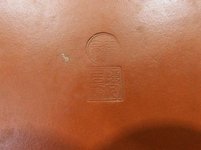Collecting pots, speculating on pots, is an approach I would not recommend as a the return is risky and very prone to wild fluctuations in value.
Biggest hazard is the lack of liquidity. If you have a high end pot, with a documented provenance, were you to need to sell it, you might post it on one or more of the on line auction sites. It may take weeks, or months or even years, for someone to come along who wants that particular size, shape and color pot at the price you list. If you lower the price, you increase the probability of a sale but it can still take time. If you end up in the situation of needing a quick sale, you might have to accept an offer only a small fraction of the original estimate of its value. A single pot, with no time pressure for sale, is at its maximum value. The least valuable is a large group of pots that have to be sold all at once.
Another hazard, is loss of provenance, and lack of provenance. I'm 66 years old, I've been collecting bonsai pots, just a few a year, since I was 25 years old. Some pots I bought with detailed provenance, like who it was made by and when it was made, the details have been lost. Forgotten. Piles of papers with receipts thrown out when clearing out old crap. Receipts that have become illegible due to paper or ink deteriorating. Bad memory. When I first bought some fine pottery, I did not think the provenance was that important when I was first getting started. And of course, not all chop marks and signatures are easy to read. Many of my best pots, or at least my personal favorites, I've completely forgotten who made them. Oh, take digital pictures, make a database on your laptop. What happens when the laptop crashes, or you die and your next of kin don't have your password? Old fashioned paper nestled in with the pot is probably best. But what about pots with trees in them? Yes, keeping records straight can really be a problem.
In addition to "loss of provenance", there is accidental inaccurate provenance, and deliberate false provenance that can severely affect final sale price of a pot. Back in the day, I bought a number of pots from a woman in the north suburbs of Chicago (some of you old farts will remember her) she had a number of behavioral diagnostic codes in her medical file. Especially when off her medication she would fabricate histories for various items around her bonsai shop. The first time or two you meet her, you might not realize what part of what she was saying was fiction, what was fact. She was the source of a number of my early purchases. For some, time has proven to be good, including a couple of early Bigei pots, but other purchases from her later proved to be production grade at best. I can't get upset, I took the bait. I also know she could not help herself when off her medication. I really enjoyed being around her, when her meds were in the "sweet zone".
But there are many Ebay sellers, and others, who mis-represent the provenance of their pots. The problem with ceramics, is it is impossible to date a ceramic just from appearance of the clay. Some things can look really old, but actually be new, some can look quite new, but actually be very old, just never used. And the seller can spin what ever yarn they want.
I bet even reputable dealers occasionally end up picking up a few pieces that are not "true to their provenance". Even they can get taken by either an unscrupulous seller, or a seller that honestly was mis-informed. The result is some "junk pots" or pots with bad provenances can be "laundered" by moving through the hands of reputable sellers. So even buying from a reputable seller is not an absolute guarantee that the pot's provenance will be "true".
So lack of liquidity, in that "quick sales" will often result in significantly less than peak return. The issues with preserving provenances. These two problems really make the "idea" of speculating, or investing in bonsai ceramics a project that is very unlikely to return on investment.
Unless, you scale up to the point where you can "average out" your yield. If you always have a few pots on auction sites, never let them go until you "get your price", and have a large enough pool of stock that if a pot doesn't sell this week, you just put it back on the shelf and put up a couple different others. But that sounds like a near full time job. A few like Matt Ouwinga can make it work. But most of us don't have the time, energy and background knowledge to make it work.
So for the average bonsai hobby grower, collect pots that you like, pots that you think you can use. Do not buy with the thought of reselling at a profit.
If you really want to turn buying and selling of pots into an income stream, you need to plan on putting serious effort into learning how to authenticate provenances. You will need to acquire the type of knowledge people like Ryan Bell and Matt Ouwinga have. If you don't educate yourself you are very likely to run into problems, and are likely to not make the money you would have hoped.




